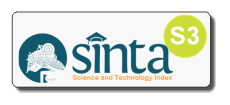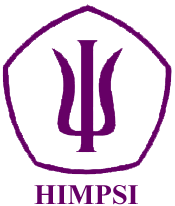Identification of Prosocial Behavior in the LDP Tagana COVID-19 Team at the Sayyid Ali Rahmatullah Tulungagung State Islamic University
Abstract
Full Text:
PDFReferences
Anvuur, A. M., & Kumaraswamy, M. M. (2012). Measurement and Antecedents of Cooperation in Construction. Journal of Construction Engineering and Management, 138(7), 797–810. https://doi.org/10.1061/(ASCE)CO.1943-7862.0000498']
Aziza, N., & Kartikaningrum, R. (2020, July 3). Kiat Keberhasilan Relawan COVID-19 dalam Membantu Sesama. Badan Nasional Penanggulangan Bencana (BNPB). https://bnpb.go.id/berita/kiat-keberhasilan-relawan-covid19-dalam-membantu-sesama
Baron, R. A., & Byrne, D. E. (2005). Social Psychology. Boston: Pearson Publishing.
Baumeister, R. F., & Vohs, K. D. (2007). Self-Regulation, Ego Depletion, and Motivation. Social and Personality Psychology Compass, 1(1), 115–128. https://doi.org/10.1111/j.1751-9004.2007.00001.x
Beaton, D. E., Bombardier, C., Guillemin, F., & Ferraz, M. B. (2000). Guidelines for the Process of Cross-Cultural Adaptation of Self-Report Measures. Spine, 25(24), 3186–3191. https://doi.org/10.1097/00007632-200012150-00014
Bodenmann, G. (2008). Dyadic Coping and the Significance of This Concept for Prevention and Therapy. Zeitschrift Für Gesundheitspsychologie, 16(3), 108–111. https://doi.org/10.1026/0943-8149.16.3.108
Byrne, M. H. V., Ashcroft, J., Wan, J. C. M., Alexander, L., Harvey, A., Schindler, N., Brown, M. E. L., & Brassett, C. (2021). Examining Medical Student Volunteering During the COVID-19 Pandemic as a Prosocial Behavior During an Emergency (p. 2021.07.06.21260058). medRxiv. https://doi.org/10.1101/2021.07.06.21260058
Caprara, G. V., Steca, P., Zelli, A., & Capanna, C. (2005). A New Scale for Measuring Adults’ Prosocialness. European Journal of Psychological Assessment, 21(2), 77–89. https://doi.org/10.1027/1015-5759.21.2.77
Eisenberg, N. (2003). Prosocial Behavior, Empathy, and Sympathy. In M. H. Bornstein, K. A. Moore, C. L. M. Keyes, & L. Davidson (Eds.), Well-Being: Positive Development Across the Life Course (pp. 253–265). Mahwah: Lawrence Erlbaum Associates Publishers. https://doi.org/10.4324/9781410607171
Feeney, J. A., & Fitzgerald, J. (2022). Autonomy–Connection Tensions, Stress, and Attachment: The Case of COVID-19. Current Opinion in Psychology, 43, 18–23. https://doi.org/10.1016/j.copsyc.2021.05.004
Goleman, D. (1996). Emotional Intelligence: Why It Can Matter More Than IQ. London: Bloomsbury Publishing.
Jolliffe, D., & Farrington, D. P. (2006). Development and Validation of the Basic Empathy Scale. Journal of Adolescence, 29(4), 589–611. https://doi.org/10.1016/j.adolescence.2005.08.010
Karnaze, M. M., Bellettiere, J., & Bloss, C. S. (2022). Association of Compassion and Empathy With Prosocial Health Behaviors and Attitudes in a Pandemic. PLOS ONE, 17(7), e0271829. https://doi.org/10.1371/journal.pone.0271829
Krueger, R. F., Hicks, B. M., & McGue, M. (2001). Altruism and Antisocial Behavior: Independent Tendencies, Unique Personality Correlates, Distinct Etiologies. Psychological Science, 12(5), 397–402. https://doi.org/10.1111/1467-9280.00373
Lestari, N., Nurhayati, T., & Udin, T. (2020). Kerja Sama Guru dan Orang Tua dalam Mengembangkan Perilaku Prososial Siswa Kelas IV MI Nurullah Kabupaten Cirebon. UNIEDU: Universal Journal of Educational Research, 1(2), Article 2.
Mufidah, L., Iswinarti, I., & Fasikhah, R. S. S. (2021). Dukungan Sosial dengan Perilaku Prososial Dimediasi oleh Empati Pada Siswa. PSIKOVIDYA, 25(1), Article 1. https://doi.org/10.37303/psikovidya.v25i1.154
Mujianti, L., & Yudiani, E. (2021). Dyadic Coping pada Penderita Lupus dan Pasangannya di Komunitas Persatuan Lupus Sumatera Selatan (PLSS). Indonesian Journal of Behavioral Studies, 1(4), Article 4. https://doi.org/10.19109/ijobs.v1i4.11926
Myers, D. G. (2009). Social Psychology (10th ed.). New York: McGraw-Hill.
Pamungkas, C. V. T. S. (2020). Tagana Tulungagung Bertugas di Lokasi Karantina COVID-19. UbahLaku.Id. https://ubahlaku.id/read/107826/tagana-tulungagung-bertugas-di-lokasi-karantina-covid-19
Ratih, P. D. (2021). Perilaku Prososial: Ditinjau dari Kepribadian dan Empati Tenaga Medis Saat Pandemi COVID-19. UG Journal, 15(11), Article 11.
Sari, H. P., & Rastika, I. (2020, March 3). Kemenkes Tetapkan Status KLB Untuk Virus Corona. KOMPAS.com. https://nasional.kompas.com/read/2020/03/03/18511341/kemenkes-tetapkan-status-klb-untuk-virus-corona
Setiawan, A., & Budiman, B. (2021). Perilaku Prososial pada Relawan Komunitas Peduli Kanker Anak dan Penyakit Kronis Lainnya (KPKAPK) Kota Palembang. Indonesian Journal of Behavioral Studies, 1(4), Article 4. https://doi.org/10.19109/ijobs.v1i4.11920
Statistik Nakes yang Meninggal. (2022). Lapor Covid-19. https://nakes.laporcovid19.org/statistik
Takwin, B. (2021). Catatan Editor: Mengembangkan Penelitian Tentang Tingkah Laku Prososial dan Altruisme. Jurnal Psikologi Sosial, 19(1), 3–6.
Tekin, S., Sager, M., Bushey, A., Deng, Y., & Uluğ, Ö. M. (2021). How Do People Support Each Other in Emergencies? A Qualitative Exploration of Altruistic and Prosocial Behaviours During the COVID-19 Pandemic. Analyses of Social Issues and Public Policy, 21(1), 1113–1140. https://doi.org/10.1111/asap.12277
Wilson, J. (2000). Volunteering. Annual Review of Sociology, 26(1), 215–240. https://doi.org/10.1146/annurev.soc.26.1.215
Xue, S., Kaufman, M. R., Zhang, X., Xia, S., Niu, C., Zhou, R., & Xu, W. (2022). Resilience and Prosocial Behavior Among Chinese University Students During COVID-19 Mitigation: Testing Mediation and Moderation Models of Social Support. Psychology Research and Behavior Management, 15, 1531–1543. https://doi.org/10.2147/PRBM.S364356
You, S., Lee, J., & Lee, Y. (2022). Relationships Between Gratitude, Social Support, and Prosocial and Problem Behaviors. Current Psychology, 41(5), 2646–2653. https://doi.org/10.1007/s12144-020-00775-4
Zain, A. Q., & Jafar, A. (2021). Pengaruh Empathy Care Training terhadap Perilaku Altruisme pada Relawan COVID-19 di Dusun Trajaya Kabupaten Majalengka. Acta Islamica Counsenesia: Counselling Research and Applications, 1(2), Article 2. https://doi.org/10.59027/aiccra.v1i2.106
DOI: http://dx.doi.org/10.17977/um023v12i22023p240-250
Refbacks
- There are currently no refbacks.
Copyright (c) 2023 Jurnal Sains Psikologi

This work is licensed under a Creative Commons Attribution 4.0 International License.
Reference Manager :
|
Aliansi:
Plagiarism Checker :
This work is licensed under a Creative Commons Attribution 4.0 International License.



1.png)








